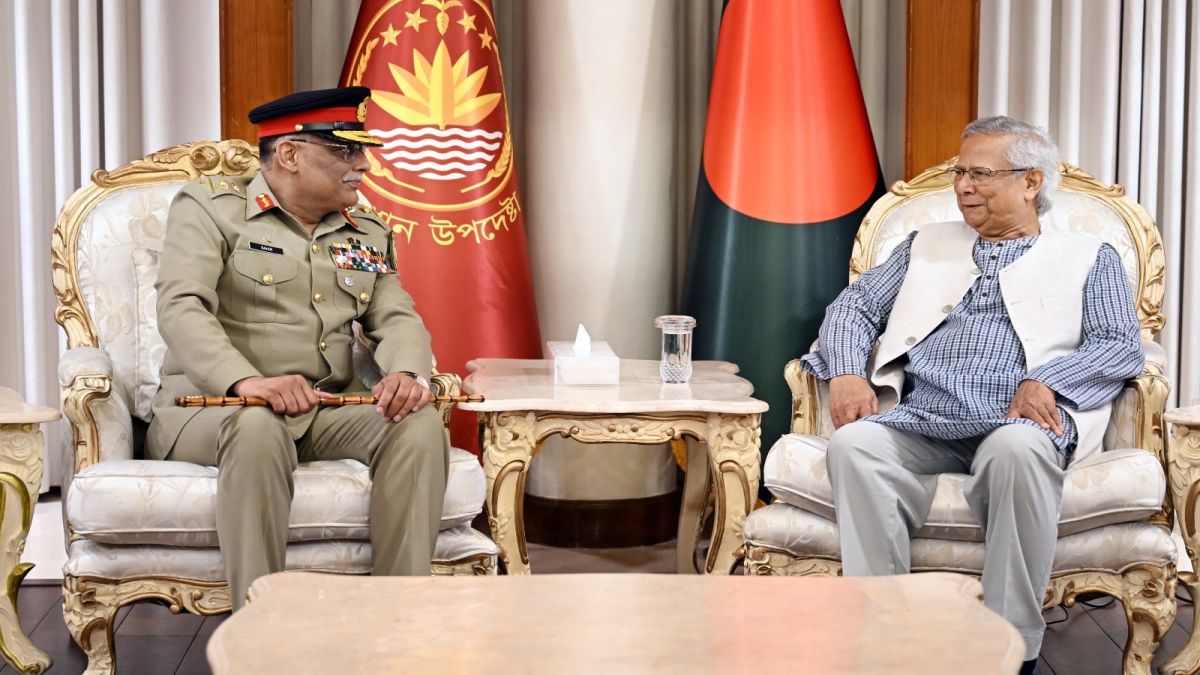Ties among nations in India’s backyard are constantly changing; friendly nations are turning foes, whereas countries that used to be at loggerheads are now forging friendships.
One such example is the Pakistan-Bangladesh relationship. Recently, Islamabad has been making overtures to Dhaka under the Muhammad Yunus interim government. The latest taking place last Saturday (October 25) when Pakistan’s Chairman of the Joint Chiefs of Staff Committee, General Sahir Shamshad Mirza paid a courtesy call on Bangladesh Chief Adviser Professor Muhammad Yunus at the State Guest House Jamuna during his official visit to Dhaka.
What took place during the meeting between the two? And more importantly, is a Pakistan-Bangladesh friendship a worry for India? Here are the answers.
Pakistani general meets with Bangladesh’s Yunus
On Saturday, the chairman of Pakistan’s Joint Chiefs of Staff Committee (CJCSC), General Sahir Shamshad Mirza, and a delegation eight other members met with Bangladesh’s Chief Advisor, Professor Muhammad Yunus, in Dhaka.
“During the meeting, they discussed a wide range of issues concerning Bangladesh-Pakistan relations, including the growing importance of bilateral trade, investment, and defence cooperation,” the chief adviser’s press wing said in a statement on Sunday.
“Emphasising the shared historical, cultural, and people-to-people ties between the two countries, General Mirza expressed Pakistan’s desire to strengthen cooperation in multiple sectors. He noted the vast potential for expanding trade, connectivity, and investment between Bangladesh and Pakistan,” it added.
“Our two countries will support each other,” General Mirza is reported to have said, adding that a two-way shipping route between Karachi and Chittagong has already begun operations, while a Dhaka-Karachi air route is expected to open within months.
As per the readout from Bangladesh, the two also discussed the ongoing situation in West Asia with both sides emphasising the need to de-escalate tensions. They further exchanged views on the spread of misinformation and the role of non-state actors in destabilising regions.
A reset in Pakistan-Bangladesh ties
Mirza is the senior most Pakistani military officer to visit Dhaka since the two nations began to rebuild ties.
With the ouster of Sheikh Hasina in August last year and the subsequent appointment of Yunus in-charge, one has seen Dhaka moving away from India and cosying up to Pakistan.
The first sign in thaw between the two nations, which have traditionally been rivals, came when Islamabad and Dhaka signed a visa-free travel agreement for holders of government and diplomatic passports. Pakistan also announced 500 scholarships for Bangladeshi students over the next five years, with 25 per cent allocated for medical education, besides increasing scholarships under its technical assistance programme and pledging specialised training for Bangladeshi civil servants.
Moreover, the two countries also announced the resumption of direct flights — the last direct flight between the two countries was operated by Pakistan International Airlines (PIA) in 2018.
The two nations have also established direct maritime links between the two after 47 years.
That’s not all, last September, Bangladesh also lifted imported restrictions on Pakistani goods. Earlier, all goods coming from Pakistan had to be offloaded onto other vessels — mostly belonging to Sri Lanka or Malaysia — before it came to Bangladesh. These vessels also required a mandatory physical check from Bangladeshi authorities.
Worry for India
But what does this reset of Pakistan-Bangladesh ties mean for India? New Delhi should be wary of the developments taking place in its backyard, as it could change the geopolitical scenario in the region.
India’s Chief of Defence Staff General Anil Chauhan, in July, had warned that a growing alignment between Pakistan, Bangladesh and China could pose serious challenges for India’s security. “There is a possible convergence of interest we can talk about between China, Pakistan, and Bangladesh that may have implications for India’s stability and security dynamics,” he noted.
This is because Bangladesh and India share a porous border through which goods and people can be easily moved. Security officials fear that the friendship between the two neighbouring countries will give rise to militancy and smuggling along the India-Bangladesh border. In fact, in 2004, Indian officials seized around 1,500 boxes of Chinese ammunitions, worth an estimated $4.5-7 million. They were allegedly meant for the banned group — ULFA. According to officials, Pakistan’s Inter-Services Intelligence (ISI) was behind this move.
Also, the map presented by Yunus to the Pakistani general is bound to cause concern in India. As per an India Today report, the Bangladesh leader presented the Pakistani general with a controversial map depicting Assam and other northeastern states as part of Bangladesh.
Interestingly, this isn’t the first time that Yunus has spoken of India’s northeastern states. Back in April when he visited China, he raised the hackles of New Delhi when he claimed that Dhaka was the “only guardian of the ocean” for the region, as northeast India was “landlocked”. Through it, he encouraged China to expand its influence in the region and bolster its economy.
Experts also note that Dhaka’s shift towards Islamabad presents a most direct and immediate threat to India. As the Scroll reports, if Dhaka and Islamabad institutionalise defence links, New Delhi would face the grim prospect of adversarial forces gaining leverage on both its western and eastern borders.
Many note that a strengthening of ties between Pakistan and Bangladesh dilutes India’s influence in South Asia and weakens its ability to project stability in the Bay of Bengal and the north east. It also risks reviving old patterns of proxy conflict, where Pakistani intelligence leverages Bangladeshi territory to stir unrest in India’s northeast.
Hence, India must keep its guard up and take close note of the developments in their backyard. The solace for New Delhi right now is that not everyone in Bangladesh agrees with Yunus’ alignment with Pakistan. There is a large section of Bangladeshis who are wary of Pakistan.
But it’s to be seen if this reluctance remains or changes in the long run.
With inputs from agencies
)